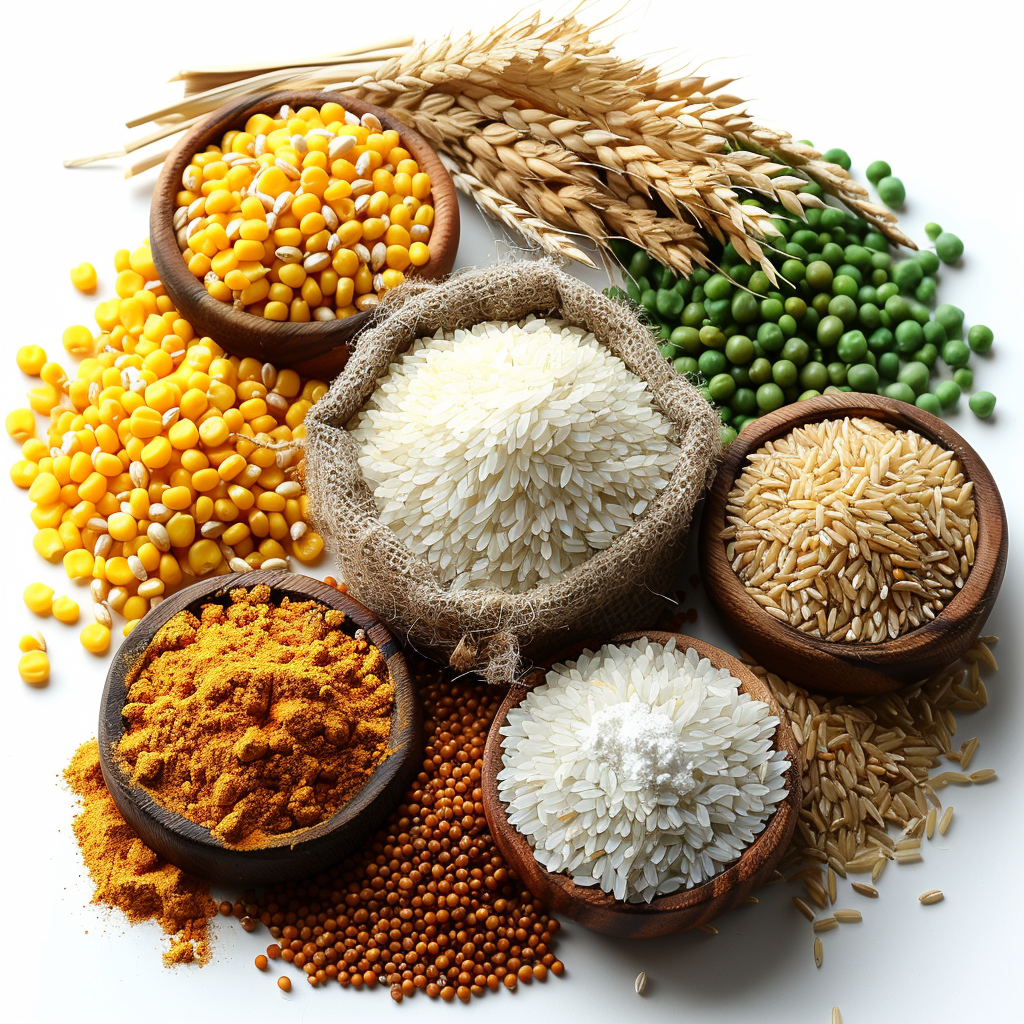Why Choose a Grainfree Dog Food Diet, What Damage They Can Cause, and Much More You Can Read Here. ALWAYS Opt for Grain-Free Food!
Grains, a common ingredient in many commercial and veterinarian dog foods, are often considered an essential part of our loyal companions’ diets. However, there is still a large shadow over the role of grains and their impact on dogs’ health. Let’s take a look at why grains are not as innocent as they seem.
What Grains Do in a Dog’s Stomach?
Grains contain Amylase Trypsin Inhibitors (ATIs), substances naturally occurring in grains and serving as protection. When a dog eats grains, ATIs can block the activity of certain enzymes that break down nutrients, such as α-amylase (involved in starch breakdown) and trypsin (involved in protein breakdown). This can lead to a range of problems, including flatulence, bloating, and digestive issues.
The Importance of Amylase and Stomach Acid for Dogs’ Digestion
Unlike humans, dogs produce relatively little amylase, the enzyme responsible for starch breakdown. Additionally, a dog’s stomach pH is much more acidic than that of a human, which normally aids in food breakdown and killing potentially harmful bacteria. However, when dogs consume grains rich in ATIs, these substances can reduce the natural acidity of the stomach, slowing digestion and increasing the risk of digestive problems. This disrupts dogs’ normal digestive process and can lead to reduced nutrient absorption, contributing to the development of health issues such as diarrhea, red spots, itching, hair loss, …
Negative Effects of Grains on Digestion
Slow digestion can lead to reduced nutrient absorption and can, in some dogs, lead to intolerances and allergies to grains. Additionally, the ATIs in grains can cause inflammation in the stomach, which can contribute to a range of health problems, such as stomach ulcers and intestinal irritation.
Symptoms of Grain-Related Issues
Symptoms of grain-related problems in dogs can range from mild to severe, including vomiting, diarrhea, weight loss, itchy skin, and gastrointestinal problems. These symptoms can significantly affect your pet’s well-being.
Why Grainfree Dog Food Is a Better Option
Grainfree food provides an alternative that can support your dog’s digestion and help prevent potential health problems. By going grain-free, you avoid the negative effects of ATIs and give your dog a diet that better suits their natural needs. Additionally, animal proteins remain the most important and preferably in as fresh a form and as minimally processed as possible.
Alternatives to Grains: Potato and Sweet Potato
As alternatives to grains, carbohydrate sources like potato and sweet potato in dogs’ diets are a much better choice. In addition to providing carbohydrates, these options can also offer a wide range of nutrients that contribute to overall dog health. However, be sure to keep the percentages of both below 30%.
Potato as a Carbohydrate Source:
- Potato is not only an excellent source of carbohydrates but also contains important nutrients such as vitamin C, B vitamins, and minerals like potassium and magnesium.
- The high fiber content in potato can support dogs’ digestion and promote intestinal health, while also providing a long-lasting feeling of satiety.
Sweet Potato as a Carbohydrate Source:
- Sweet potato is rich in beta-carotene, a powerful antioxidant that can contribute to healthy skin and coat, as well as a strong immune system.
- Additionally, sweet potato also contains vitamin A, vitamin C, and various B vitamins, which are essential for overall dog health.
- With a lower glycemic index than regular potato, sweet potato provides a slower release of glucose into the blood, minimizing spikes in blood sugar levels and promoting a more stable energy release.
The lower glycemic index of both potato and sweet potato means they are digested and absorbed more slowly compared to grains, minimizing spikes in blood sugar levels. This is beneficial for dogs’ digestion because it promotes a more stable energy release and can help prevent spikes in insulin production, which can contribute to healthy weight and balanced blood sugar levels in dogs. Grains are characterized by their high glycemic index, meaning they are quickly broken down into sugars in the body.

Conclusion
Grains can cause digestive problems in dogs, leading to a range of health issues. Avoiding grains in your dog’s diet is a simple yet effective way to improve their health and well-being. Unfortunately, grains are still used in over 95% of all dog foods due to their low cost and to boost the overall protein content in the analytical composition. Even in the vast majority of “specialized veterinary diets,” they are still found as one of the main ingredients. Therefore, always try to avoid everything from corn, wheat, rice, etc., in your dog’s diet (including snacks, table scraps, supplements, etc.). Based on our own experience and the countless stories from therapists, pet stores, trainers, coaches, customers, etc., who work with our products and strictly follow this advice, we have been able to solve many problems, including epilepsy, simply by completely excluding grains from the diet.
Artikellen
Kubota M, Saito Y, Masumura T, Watanabe R, Fujimura S, Kadowaki M. In vivo digestibility of rice prolamin/protein body-I particle is decreased by cooking. J Nutr Sci Vitaminol (Tokyo). 2014;60(4):300-4. doi: 10.3177/jnsv.60.300. PMID: 25297621.
Mandigers PJJ. Het voorkomen van epilepsie bij de Nederlandse hondenrassen. Tijdschrift voor diergeneeskunde.
2017(2):28-32.
Geisslitz S, Weegels P, Shewry P, Zevallos V, Masci S, Sorrells M, Gregorini A, Colomba M, Jonkers D, Huang X, De Giorgio R, Caio GP, D’Amico S, Larré C, Brouns F. Wheat amylase/trypsin inhibitors (ATIs): occurrence, function and health aspects. Eur J Nutr. 2022 Sep;61(6):2873-2880. doi: 10.1007/s00394-022-02841-y. Epub 2022 Mar 2. PMID: 35235033; PMCID: PMC9363355.
